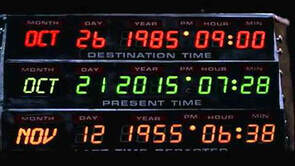 Sadly on October 21, 2015, we woke up and didn't have hoverboards, shoes that tied themselves, or flying DeLorean cars. For those of you unfamiliar with 80's pop culture references, that's the day that Marty McFly went "back to the future" in the 1985 hit movie. Like most of us who grew up in the 80s with future dreams of flying cars and robots who do our chores for us (in Cub Scouts I made a "homework machine" so I wouldn't have to do long division anymore. But it was made of styrofoam), the future hasn't quite panned out like we had expected. I believe one of the key tasks of a leader is to project the future. Not in a crystal ball or sci-fi sense, but to begin asking questions and taking steps now for when the landscape changes later. The way we do ministry now will not be the way it's done in 15, 20, or even 5 years. 1. Do we love traditions more than people? - If our services, calendars, programming, and priorities look the same now as they did years ago, and we're resistant to change, then we love traditions more than we love people. Traditions are great. They help create a common culture. But traditions can also be a roadblock to growth. Sometimes the goal is to keep up with the traditions rather than see the secondary value of them. 2. Are we willing to be culturally weird? - A consistently biblical ethic of sexuality, marriage, gender, and family is going to move further away from cultural acceptance. For the church, and for ministry leaders, to continue to hold (with convictional kindness) a biblical ethic, it will be difficult. It's a cost we have to be willing to count. 3. How will we engage our communities? - The attractional model of church worked great when the culture was largely christian. As we move into a more post-Christian context, how will we engage our communities? We can't assume that people will come because our building is snazzy or our social media ad campaign hit their screens. Our engagement will have to move more organically, more relationally, more servant-oriented. 4. What about the children? - Kids are growing up faster, more digitally connected, and less likely to grow up with any kind of Gospel witness. In the church we're learning that answers like "The Bible says so!" are insufficient for a generation with Google at their fingertips. If we're going to cultivate multigenerational faithfulness, we have to do more than offer good snacks and a Bible story. Our children's ministry builds foundations of the faith, and our youth ministries must move past entertainment towards intentional discipleship. 5. How do we care for the building? - Increasing facility costs are going to end up handcuffing a lot of churches. That dream sanctuary or education space is going to need repairs, and lots of them. Deferred maintenance is an unseen debt crippling churches. If we're going to lead forward, we have to begin to embrace both a multi-purpose sense of space and an openness to be a community center. Sharing space with other ministries and groups allows your footprint in the community to increase, and it provides a needed source of revenue. 6. Can we live smaller? - The tiny house revolution hasn't just stopped at decluttering and simplifying where we live, it's extended into the church. As aging generations who had institutional loyalty begin to die, we're going to be left with a lot of empty seats, and a necessity to figure out how to function with less. We'll have to move from a programmatic approach to a relational, groups-based approach that doesn't require as much overhead. 7. Will we build battle lines or bridges? - We can, and should, have secondary distinctions that we hold to by conviction and practice. There's nothing wrong with that. That's why I'm a Baptist and not a Presbyterian or Anglican. It helps us create a common identity with others. But when it comes to those with whom we'd differ on secondary issues, we can either build battle lines and treat them as the enemy, or we can build bridges recognizing our mutual faith in Jesus. Bridges of fellowship bring together churches to fulfill the Great Commission, even with our particular distinctions. What are some other questions we should be asking as leaders?
1 Comment
2/15/2021 09:55:10 am
Reply
Leave a Reply. |
Scott M. DouglasA blog about leadership and the lasting legacy of family ministry. Archives
August 2023
Categories
All
|
 RSS Feed
RSS Feed



